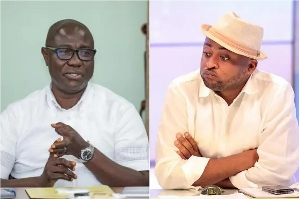This periodical discusses how and why the successive NDC governments failed to improve upon Ghana’s economic fortunes.
There is no denying the fact that governance is a serious business and as such it requires forward thinking, serious and committed group of people to bring about the needed prosperity.
Nevertheless, it has not been the case in Ghana’s democratic dispensation. The emergence of multi-party democracy has given birth to multifarious political parties, albeit Ghana has remained duopoly during the Fourth Republic.
Regrettably, however, we have over the years been electing a semicircle of mediocre economic managers who have only succeeded in sinking the economy deeper and deeper into the mire.
Apparently, Ghana’s Fourth Republic is 290 months old. And the management of the country within that time frame had been a shared responsibility between the National Democratic Congress (NDC), whose share of the governance is 192 months, and the New Patriotic Party (NPP), who had also governed the country for 98 months.
Obviously there is a lot to squall and scold about, with regard to the day-to-day management of Ghana. However, I will dwell largely on the NDC’s last 96 months administrations which culminated in an unbelievable economic meltdown.
If we stroll down memory lane, former President Rawlings 96 months democratic rule came to an end in 2001. Regrettably, however, former President Rawlings only managed to send us to the membership of the Highly Indebted Poor Countries (HIPC).
President Kufuor took over the presidency in January 2001. He exerted dint of critical thinking, worked strenuously for eight solid years, laid an auspicious economic foundation by stabilising the macroeconomic indicators and retired honourably.
He then passed on the baton to the late President Mills on 7th January 2009, following his victory in the second round election on 28 December 2008.
Former President Mills inherited a total debt of GH9.5 billion and a favourable economic growth of around 8.4 per cent in 2009.
It is worth stressing that the late President Mills was extremely fortunate to have taken over a very good economic foundation laid by the zestful enthusiast, former President Kufuor and his equally ebullient team.
Take, for instance, three years after former President Kufuor’s NPP government had discovered oil in commercial quantities, the late President Mills turned on the valve at an offshore platform in December 2010 to pump the first commercial oil.
Ghana soon joined the petroleum exporting countries. And believe it or not, Ghana started to export crude oil and thus boosted the economic growth.
The economy grew from around 8.4 per cent to around 14 per cent by 2011 and Ghana reached the Lower Middle Income status.
Delightfully, Ghana’s GDP grew from $28 billion to a staggering $47 billion in 2011.
Ghana was then earmarked as the world's fastest growing economy in 2010 (Economy Watch, 2010).
“Ghana's economy is growing at a blistering 20.15 per cent” (Economy Watch).
The late President Mills commonsensibly continued to improve upon the excellent economic foundation laid by former President Kufuor and his NPP government.
Of course, the late President Mills was not without foibles, for he was a descendant of old man Adam. Yet his light shone among the corrupt and villainous NDC apparatchiks.
Take, for example, it is on record that prior to the scandalous Wayome’s judgement debt payment of GH51.2 million, the late Mills warned the ‘create, loot and share’ cabals not to effect payment, yet the conspiratorial plotters defied the good old Mills orders and doled out the staggering amount to Wayome, who had no contract with the government of Ghana.
Unfortunately, the late President Mills somehow succumbed to his appointees shenanigans and allowed the create loot and share cabals to have their way.
The brassbound cabals began to dip their ‘thievery’ hands into the national coffers through dubious judgement debt payments and other cloudy deals.
The racketeers even managed to allocate judgement debt amount in the national budget (around GH600 million), with a view to creating, looting and sharing.
Sadly, President Mills mysteriously departed from life in July 2012. Per Ghana’s 1992 Constitution, Vice President Mahama was the next in line to take over the presidency.
Bizarrely, things started to fall apart. It went from bad to worse following President Mills sudden and mysterious death.
Ghana’s total debt rocketed astronomically following the unbridled spending in the 2012 general election and the numerous corruption scandals involving GYEEDA, SADA, SUBA, Bus Branding, dubious judgement debt payments and many others.
Thus, it did not come as a surprise to some of us when President Nana Akufo-Addo hinted during his recent state of the nation address that Ghana’s total debt has ballooned to a staggering GH122 billion as of December 2016.
Unsurprisingly, following President Akuffo-Addo’s state of the nation address, the disputatious NDC apparatchiks have come out fighting their way through in a desperate attempt to present their version of the conspicuously gloomy economic outlook.
Where is the justification when a GH9.5 billion debt in 2009 rocketed to GH122 billion in just eight years?
How can you convince some of us when you woefully shrunk Ghana’s GDP from $47 billion to $37 billion in five years?
How could you lots beat your chests and claim perquisite to excellent economic management when you abysmally dragged an economic growth of around 8.4 per cent in 2009 to a squeamish 3.6 per cent as of December 2016?
The fact of the matter is that the successive NDC governments have proven to be worst economic managers who can never improve upon the socio-economic standards of living of Ghanaians.
K. Badu, UK.
Opinions of Thursday, 23 February 2017
Columnist: Badu, K















